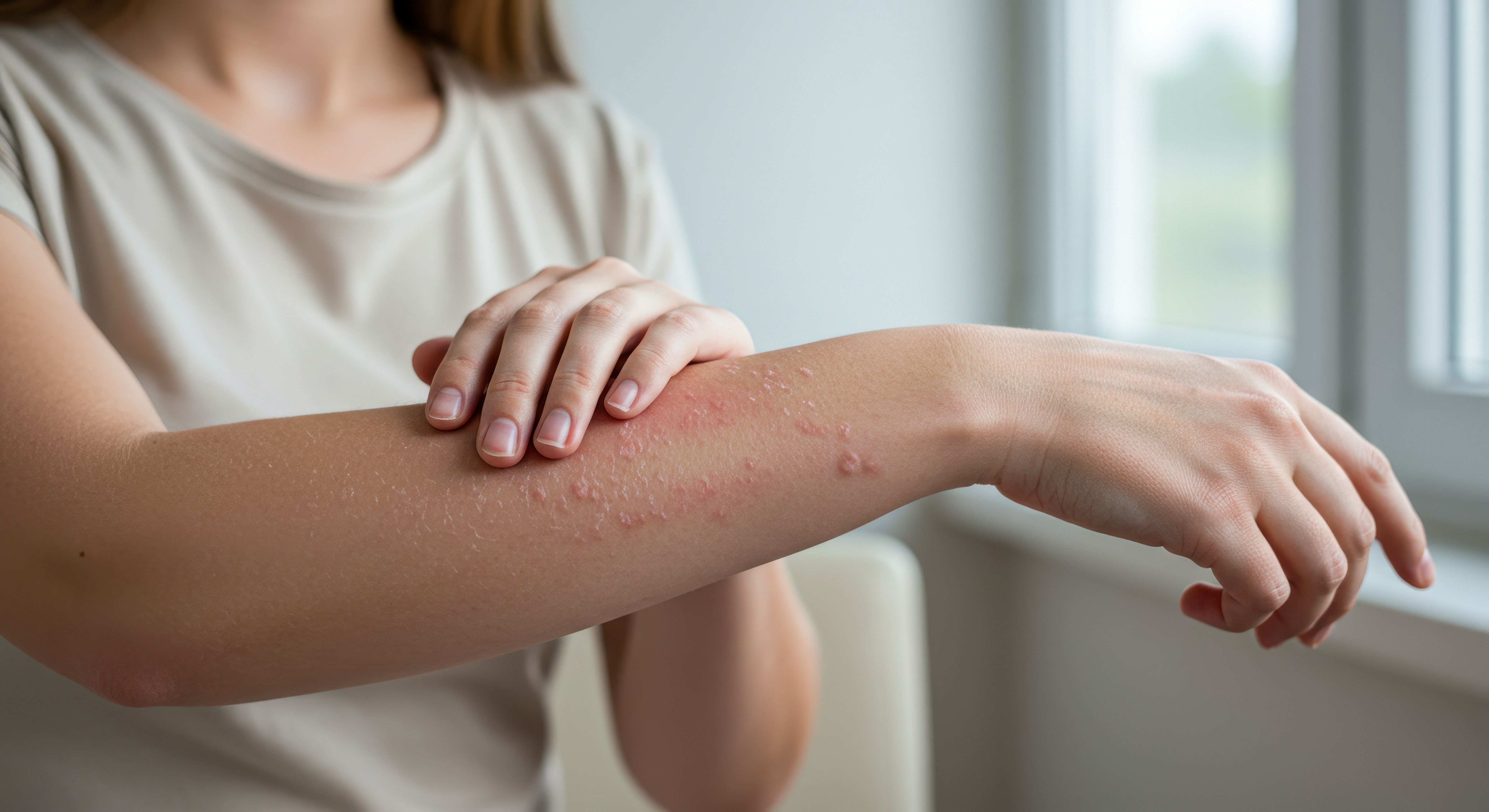- Center on Health Equity & Access
- Clinical
- Health Care Cost
- Health Care Delivery
- Insurance
- Policy
- Technology
- Value-Based Care
Remibrutinib Demonstrates Early, Sustained Efficacy and Favorable Safety in CSU
Remibrutinib demonstrated rapid and sustained symptom relief for chronic spontaneous urticaria in a pooled analysis of REMIX-1 and REMIX-2.
Remibrutinib (Rhapsido; Novartis) showed sustained efficacy and favorable safety at 52 weeks in a pooled analysis of the REMIX-1 (NCT05030311) and REMIX-2 (NCT05032157) trials, with results presented at the American College of Allergy, Asthma & Immunology (ACAAI) 2025 Annual Meeting.1
A statistically significant and clinically meaningful reduction in symptoms was observed as early as week 2 for both hive severity and itch in patients with CSU treated with remibrutinib. | Image Credit: StockWorld - stock.adobe.com

The oral, highly selective, reversible Bruton's tyrosine kinase (BTK) inhibitor was FDA approved for the treatment of chronic spontaneous urticaria (CSU) in patients who remain symptomatic despite treatment with H1 antihistamine therapy in September 2025.2 Updated data presented at ACAAI 2025 reinforce the agent’s efficacy and safety in this challenging patient population.1
The findings stem from a pooled analysis of the 2 global, phase 3, double-blind, placebo-controlled REMIX-1 and REMIX-2 trials, which evaluated the long-term efficacy and safety of remibrutinib at 100 mg twice daily. The analysis focused on adults with moderate-to-severe CSU who continued to experience symptoms despite antihistamine therapy. Efficacy was measured using the Urticaria Activity Score (UAS7), Itch Severity Score (ISS7), and Hives Severity Score (HSS7).
The pooled analysis demonstrated that remibrutinib provides rapid and sustained improvements across key CSU measures compared with placebo.
A statistically significant and clinically meaningful reduction in symptoms was observed as early as week 2 for both hive severity and itch. These benefits were not only rapid but also sustained over the 52-week treatment period. By week 52, patients treated with remibrutinib showed a mean –74.8% change from baseline in UAS7, a –73.6% change in ISS7, and a –75.2% change in HSS7.
“It's always exciting for us to see patients that have been suffering for so long have an improvement in their symptoms so quickly,” study investigator Michael Palumbo, MD, an allergy and immunology physician at Allergy and Clinical Immunology Associates in Pittsburgh, PA, told The American Journal of Managed Care® in an interview.3 “Obviously, 1 week is never an end point for a clinical trial, but seeing patients already noticing symptom improvement within 3 days really leads to helping keep patients consistent on dosing.”
Patients who transitioned from placebo to remibrutinib at week 24 also showed a substantial reduction in mean UAS7, ISS7, and HSS7 as early as 1 week following the transition, and efficacy was maintained through week 52. Percentage improvements in UAS7, ISS7, and HSS7 at week 25 were 66.8%, 65.6%, and 67.5%, respectively. By week 52, those treated with remibrutinib showed improvements of 75.5%, 74.2%, 75.9% in UAS7, ISS7, and HSS7, respectively.
“These outcomes indicate that remibrutinib provides fast and sustained symptom relief for patients with CSU who remained symptomatic despite treatment with second-generation H1 antihistamines,” the authors concluded.
The overall safety profile of remibrutinib was favorable and generally well-tolerated over the 52-week observation period, with a similar proportion of patients who received remibrutinib (64.9%) and placebo (64.7%) experiencing adverse events (AEs). There were no serious AEs attributed to remibrutinib use.
“It's very exciting to have an oral option for our patients that have failed high-dose oral antihistamines. That's where you're going to consider starting [remibrutinib]. Currently, the only medications that were approved and indicated for CSU were injectable medications, so it's very exciting to have an option for patients that is oral and not an injection, as a lot of patients are wary or afraid of getting an injection—especially an injection that would need to be repeated. It's great to have that option.”
References
1. Gogate S, Palumbo M, Giménez-Arnau A, et al. Early and sustained efficacy of remibrutinib in adult patients with CSU: pooled analysis of REMIX-1/-2. Poster presented at: American College of Allergy, Asthma & Immunology 2025 Annual Meeting; November 13-16, 2025; Orlando, FL. Poster R083.
2. McNulty R. FDA approves remibrutinib for chronic spontaneous urticaria. AJMC. September 30, 2025. Accessed November 19, 2025. https://www.ajmc.com/view/fda-approves-remibrutinib-for-chronic-spontaneous-urticaria
3. McNulty R, Palumbo MJ. Quick responses may boost adherence to remibrutinib in CSU: Michael J. Palumbo, MD. AJMC. November 19, 2025. Accessed November 19, 2025. https://www.ajmc.com/view/quick-responses-may-boost-adherence-to-remibrutinib-in-csu-michael-j-palumbo-md
